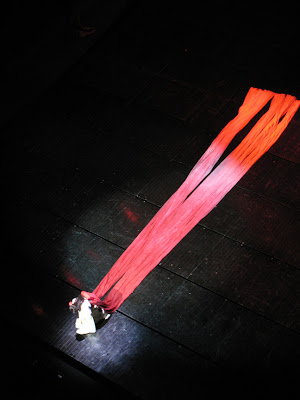It's not the length, but how you use it
 Verdi AIDA, Met 30.X.2007; c. Ono; Carosi, Borodina, Farina, Dobber, Kowaljow, Kavrakos.
Verdi AIDA, Met 30.X.2007; c. Ono; Carosi, Borodina, Farina, Dobber, Kowaljow, Kavrakos.
The Met decided to nix the third intermission of their classic production of Aida, intended to shorten the evening by a half-hour, but the opera actually felt longer, thanks to Maestro Kazushi Ono's funeral parlor treatment of the score. There were finely spun details and moments of ravishing beauty, but dispersed throughout a generally lifeless evening. It's not so much that his metronome's default setting is on largo, but that he is a metronome. I don't mind slow (cf. Levine), but what makes the music drag so much more is when there's only minimal variation in tempi beyond the most obvious shifts. To sustain life on stage, the opera's breathing and pulse must race and retard organically, and triply so for the romantic Italian rep. Instead, Ono appeared to be content in presiding over a grand autopsy. If forced to point out a plus: his mathematical articulation highlighted things I never noticed in the score. Oh, another "plus": I never paid much attention to the whispering male chorus in the temple scene (Act I, Sc 2) till last night-- Ono certainly gave me a few extra moments to notice it.
Despite the funeral in the pit, however, the Aida of Micaela Carosi is full flesh. In the long line of Aidas in recent years, hers is the most nuanced and thoughtful. She has lovely high notes, at times quite thrilling; an engaging dynamic plan, insterspersing more than usual mezza voces to make her fortes appear gigantic; an alluring stage presence. However, she has a tendency to wash off the vibrato in some of her mid-register notes, making her sound a bit whiny and wail-y, sometimes gray and dull. Moreover, there's significant wavering in pitch. She must address this unevenness. Olga Borodina is her same competent self, but the iconic status of Dolora Zajick's Amneris at the Met is a no-win situation for any mezzo. Franco Farina, temp-ing as Radames, wasn't the trainwreck I feared. Without the wobble at the top, and with less of that brute, rough delivery, it would have been an acceptable, if unmemorable, performance.


















